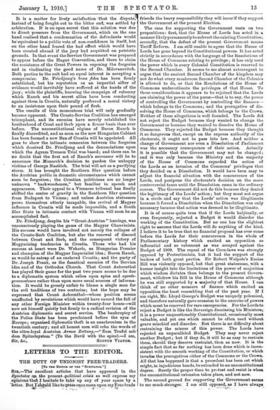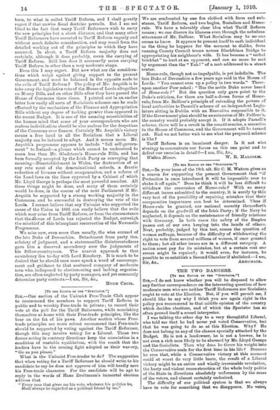LETTERS TO THE EDITOR.
THE DUTY OF UNIONIST FREE-TRADERS. PTO TUE EOITOR Or THY " SPECTATOR:1 Sln,—Thi excellent articles that have appeared in the Sif-dator OR -the present political _crisis so well express my opinions"; that I hesitate to tidier up any of your space_ by a letter. ButTiffiVild like to•press once more upon my F ree-trade
the Government at the present Election.
The case for supporting the Government rests on two propositions : first, that the House of Lords has acted in a manner likely permanently to subvert the existing Constitution; secondly, that the defeat of the present Government means Tariff Reform. I am still unable to agree that the House of Lords has gone beyond its Constitutional powers. It has acted strictly in accordance with the language of the Resolutions of the House of Commons relating to privilege ; it has only used the power which in every Colonial Constitution is reserved to the Second Chamber. It seems to me almost extravagant to argue that the ancient Second Chamber of the kingdom may not do what every mushroom Second Chamber of the Colonies is allowed to do, or that the Resolutions of the House of Commons underestimate the privileges of that House. To these considerations it appears to be rejoined that the Lords are claiming the power of the purse—that is to say, the power of controlling the Government by controlling the finances— which belongs to the Commons; and the prerogative of dis- solving the House of Commons, which belongs to the Crown. Neither of these allegations is well founded. The Lords did not reject the Budget because they wanted to change the Government or because they wanted to dissolve the House of Commons. They rejected the Budget because they thought it so dangerous that, except on the express authority of the electorate, it ought not to pass into law. And neither a change of Government nor even a Dissolution of Parliament was the necessary consequence of their action. Actually it is possible that the Government may not be changed ; and it was only because the Ministry and the majority of the House of Commons regarded the action of the Lords as an invasion of the Commons' privileges that they decided on a Dissolution. It would have been easy to adjust the financial situation with the concurrence of the Lords, and postpone the electorate's decision on the more controversial taxes until the Dissolution came in the ordinary course. The Government did not do this because they denied the legitimacy of the Lords' action ; but they must not argue in a circle and say that the Lords' action was illegitimate because it forced a Dissolution when the Dissolution was only necessary because that action was deemed to be illegitimate.
It is of course quite time that if the Lords habitually, or even frequently, rejected a Budget it would disorder the working of the Constitution. But no one has the slightest right to assume that the Lords will do anything of the kind. I believe it to be true that no financial proposal has ever come before the Lords for their concurrence in the whole of Parliamentary history which excited an opposition so influential and so vehement as was arrayed against the Budget of 1909. The repeal of the Corn-laws was strongly opposed by Protectionists, but it had the support of the leaders of both great parties. Sir Robert Walpole's Excise Bill was violently opposed, but that great statesman, with a keener insight into the limitations of the power of majorities which wisdom dictates than belongs to the present Govern- ment, withdrew his Bill in the House of Commons although he was still supported by a majority of that House. I can think of no other measure of finance which excited an opposition the least resembling that of the past year. If I am right, Mr. Lloyd George's Budget was uniquely polemical, and therefore naturally gave occasion to the exercise of powers which must be reserved for rare emergencies. For the Lords to reject a Budget is like the Sovereign dismissing his Ministers;, it is a power unquestionably Constitutional, occasionally most valuable, and yet one which cannot be often used without grave mischief and disorder. But there is no difficulty about restraining the misuse of this power. The Lords have rejected an unparalleled Budget. They may never reject another Budget; but if they do, it will be as easy to restrain them, should they deserve restraint, then as now. It is the simple fact that so far nothing has been done which is incon- sistent with the smooth working of the Constitution, or which invades the prerogatives either of the Commons or the Crown. All that has happened is that a precedent has been set which might, in injudicious hands, be extended to an unconstitutional degree.. Surely the proper time to protest and resist is when the unconstitutional extension takes place, and not now.
The second 'ground for supporting the Government seems to me much stronger. I am still opposed, as I have always been, to what is called Tariff Reform, and I shall greatly regret if that unwise fiscal doctrine prevails. But I am not blind to the fact that many Tariff Reformers wish to carry the new principles but a short distance, and that many other Tariff Reformers have assented to Tariff Reform vaguely and without much definite consideration, and may recoil from the detailed working out of the principles to which they have assented. In short, a Tariff Reform majority does not certainly, although it does probably, mean the carrying of Tariff Reform. Still less does it necessarily mean carrying Tariff Reform in other than a very moderate shape.
Even this I may regret. But now what are the considera- tions which weigh against giving support to the present Government, and must be balanced in the opposite scale to the evils of Tariff Reform P The policy of Mr. Asquith is to take away the legislative veto of the House of Lords altogether on Money Bills, and on other Bills after they have passed the House of Commons three times. I pointed out in an earlier letter how easily all sorts of Socialistic schemes can be made effectual by the mechanism of the Finance and Appropriation Bills without any degree of tacking greater than appeared in the recent Budget. It is one of the amazing eccentricities of the human mind that some of your correspondents who are zealous individualists should be also zealous for the despotism of the Commons over finance. Certainly Mr. Asquith's victory means a. free hand to all the Socialism that a Liberal majority can be induced to adopt. And it means more. Mr. Asquith's programme appears to include " full self-govern- ment" to Ireland—a phrase which cannot be understood to mean less than Mr. Gladstone's Home-rule Bills, and has been formally accepted by the Irish Party as conveying that meaning—Disestablishment in Wales, the destruction of at any rate most of the denominational schools, a drastic reduction of licenses without compensation, and a reform of the Land-laws on the lines approved by a Cabinet of which Mr. Lloyd George is perhaps the most powerful member. All these things might be done, and many of them certainly would be done, in the course of the next Parliament if Mr. Asquith be supported by a strong working majority in the Commons, and be successful in destroying the veto of the Lords. I cannot believe that any Unionist who supported the cause of the Union in 1895 can really believe that the evils which may arise from Tariff Reform, or from the circumstance that the House of Lords has rejected the Budget, outweigh the mischief of this triumphant resurrection of the Newcastle Programme.
We miss now, even more than usually, the wise counsel of the late Duke of Devonshire. Detachment from party ties, sobriety of judgment, and a statesmanlike disinterestedness gave him a deserved ascendency over the judgments of his fellow-countrymen. The nearest approach to that ascendency lies to-day with Lord Rosebery. It is much to be desired that he should once more speak a word of encourage- ment and guidance to that scattered company of moderate men who, indisposed to electioneering and lacking organisa- tion, are often neglected by party managers, and yet commonly determine party contests.—I am, Sir, &c., Hume CECIL.















































 Previous page
Previous page